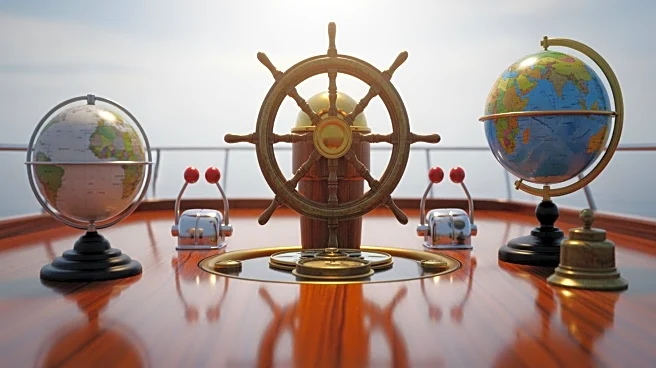What's Happening?
A panel of five prominent Greek shipowners has expressed strong opposition to the International Maritime Organization's (IMO) Net Zero Framework (NZF) during the Cyprus Maritime Conference in Limassol.
The shipowners argue that the proposed climate regulations were developed without adequate industry consultation and, if implemented, would lead to increased costs for consumers. George Procopiou, chairman of Dynacom Tankers, criticized the regulations as a 'kolotoumba,' a Greek term suggesting that the measures would achieve the opposite of their intended effect, raising both costs and emissions. Despite the alignment between shipowners and environmentalists on the goal of reducing pollution, Procopiou highlighted the lack of available green fuels as a significant barrier to achieving these objectives.
Why It's Important?
The criticism from Greek shipowners underscores the tension between regulatory bodies and industry stakeholders in the pursuit of environmental goals. The maritime industry plays a crucial role in global trade, and changes in regulations can have significant economic implications. The shipowners' concerns about increased consumer costs highlight the potential economic impact of stringent environmental regulations. This debate reflects broader challenges in balancing environmental sustainability with economic viability, particularly in industries heavily reliant on fossil fuels. The lack of available green fuels further complicates efforts to transition to more sustainable practices, potentially affecting global supply chains and trade dynamics.
What's Next?
The ongoing dialogue between the IMO and industry stakeholders is likely to continue as the maritime sector seeks viable solutions to reduce emissions without imposing excessive costs on consumers. The shipowners' call for more practical and achievable solutions may prompt further discussions on the development and availability of green fuels. As the industry navigates these challenges, stakeholders may explore alternative technologies and strategies to meet environmental targets. The outcome of these discussions could influence future regulatory frameworks and the pace of the maritime industry's transition to sustainable practices.
Beyond the Headlines
The debate over the IMO's Net Zero Framework highlights broader ethical and strategic considerations in environmental policymaking. The shipowners' critique raises questions about the inclusivity and transparency of regulatory processes, emphasizing the need for collaborative approaches that consider the perspectives of all stakeholders. The maritime industry's response to these regulations could set precedents for other sectors facing similar challenges, influencing global efforts to address climate change. The alignment between shipowners and environmentalists on pollution reduction goals suggests potential for innovative partnerships and solutions that balance environmental and economic priorities.








